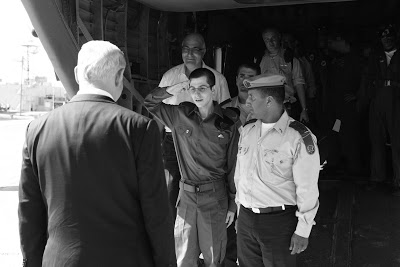 |
| Gilad Shalit salutes Prime Minister Benjamin Netanyahu. |
The release of Gilad Shalit on 18 October, in exchange for some 1,027 Palestinian prisoners was greeted by his family, Israelis and Jews from all over the world with much jubilation and relief.
The deal came at a somewhat precarious time for Israeli society, gripped by economic polarisation and political divergences. Despite an overwhelming majority who voted in favour of the exchange, it was also a day of mourning for the families of victims who lost their lives at the hands of the hundreds of now emancipated Palestinian prisoners — many of them convicted murderers serving life sentences.
Irrespective, Shalit’s release marked the end of a five and a half year ordeal, where Hamas held the IDF soldier captive in solitary confinement, with no sunlight and what has subsequently become evidently clear, very little food. Enlightening worldwide perceptions, an emaciated, bewildered and browbeaten Shalit entered the spotlight, unlike the satiated and degree-educated incarcerated Palestinian prisoners.
Appallingly, before enjoying his first home-cooked meal, Shalit was coerced into stomaching a live-broadcasted interview with Egyptian TV while still officially under Egyptian custody. He was accompanied by what appeared to be a Hamas henchman lurking in the background during the interview, dressed in traditional militant garb. This premeditated exercise undoubtedly served as an ideal opportunity for Hamas to surreptitiously communicate its ‘humane treatment’ to the international community and in-so-doing justify its actions for capturing Shalit.
While the deal again attests to Israel’s resoluteness in the pursuit of preserving human life, it is with trepidation that Israel continues its obligatory military operations. Notwithstanding the set conditions attached to the release of the Palestinian prisoners (barring of certain hard-line criminals from returning to Palestinian territories and a zero tolerance policy assumed by Israel if former prisoners are implicated in future attacks), Israel invariably runs the risk of further hostage-taking by Hamas.
For those who are indignant at the mere thought that Israel should renege on its policy of refusing to enter negotiations with terrorist organisations like Hamas, may their concerns be duly recognised. Both the value Jews place on human life and the enormous concessions the Israeli government is willing to safeguard the lives of its soldiers have provided the perfect strategy for Israel’s enemies to focus their energies. Already, chants fill the streets in the West Bank and Gaza calling for the capture of more ‘Gilad Shalits’. Palestinian Authority leader Mahmoud Abbas has repeatedly honoured and glorified the released prisoners.
More recently, we have seen a wave of renewed attacks hitting the southern Israeli cities of Ashkelon and Ashdod, emanating from Gaza and orchestrated by none other than Hamas. Israel may have averted the capture of another soldier in the immediate future. Only time will tell. For now, may Gilad Shalit, his family, friends and the entire Jewish people rejoice in the celebration of life, reconciliation and peace.











